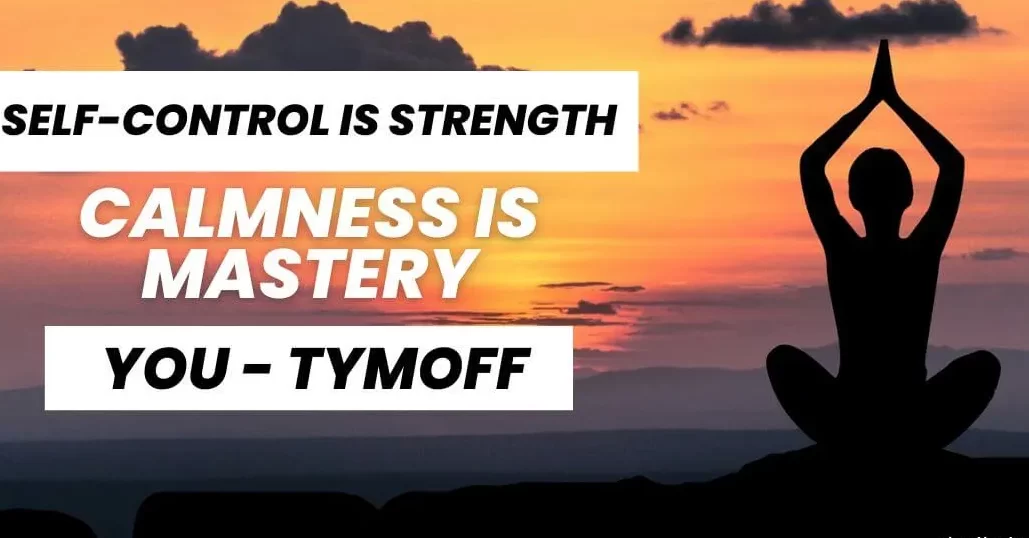In the hustle and bustle of modern life, amidst the chaos and clamor, the concept of self-control and calmness stands out as pillars of strength and mastery. This sentiment is beautifully encapsulated in the profound words, Self-Control is Strength. Calmness is Mastery. You – tymoff. Attributed to the enigmatic figure known as tymoff, these words resonate deeply, urging individuals to cultivate inner resilience and composure in the face of life’s challenges.
Understanding the Essence of Self-Control and Calmness
Self-Control: It is the ability to regulate one’s thoughts, emotions, and actions in the pursuit of long-term goals and values. Self-control empowers individuals to resist temptations, overcome impulses, and make rational decisions even in challenging circumstances. It serves as a shield against impulsivity and recklessness, fostering discipline and perseverance.
Calmness: Calmness is the state of tranquility and serenity that arises from a composed mind and a peaceful heart. It is the ability to maintain inner equilibrium amidst external turbulence, to remain centered and grounded in the midst of chaos. Calmness enables individuals to navigate life’s ups and downs with grace and resilience, approaching challenges with clarity and poise.
The Power of Self-Control is Strength. Calmness is Mastery. You – tymoff in Daily Life
Strength: Self-Control is Strength. Calmness is Mastery. You – tymoff cultivates inner strength, empowering individuals to stay focused on their goals and values despite distractions and temptations. It enables them to resist unhealthy habits, delay gratification, and persevere through adversity. With self-control, individuals harness their willpower to overcome obstacles and achieve success in various aspects of life, whether it be personal growth, career advancement, or relationship fulfillment.
Mastery: Calmness is the hallmark of mastery, signifying a deep sense of self-assurance and emotional intelligence. It allows individuals to respond to challenges with clarity and foresight, rather than reacting impulsively out of fear or anger. Mastery of calmness enables individuals to maintain perspective in turbulent times, to approach conflicts with empathy and understanding, and to lead others with wisdom and grace.

Embracing the Philosophy of Self-Control is Strength. Calmness is Mastery. You – tymoff
Personal Development: Incorporating Self-Control is Strength. Calmness is Mastery. You – tymoff into daily life fosters personal development and growth. Through mindfulness practices, such as meditation and deep breathing exercises, individuals can cultivate greater self-awareness and emotional regulation. They learn to observe their thoughts and feelings without judgment, allowing them to respond thoughtfully rather than react impulsively.
Relationships: Self-control and calmness are invaluable assets in fostering healthy and harmonious relationships. By remaining composed during conflicts and disagreements, individuals can communicate effectively and resolve conflicts constructively. They cultivate empathy and compassion, building trust and intimacy with their loved ones.
Cultivating Self-Control is Strength. Calmness is Mastery. You – tymoff
Mindfulness Practices: Engage in mindfulness practices such as meditation, yoga, or tai chi to cultivate self-awareness and emotional regulation. These practices help individuals develop greater clarity of mind and inner peace, enabling them to navigate life’s challenges with resilience and grace.
Stress Management: Develop effective stress management strategies, such as deep breathing exercises, progressive muscle relaxation, or journaling, to alleviate stress and anxiety. By managing stress effectively, individuals can maintain their composure and focus, even in the face of adversity.
Healthy Habits: Prioritize self-care and adopt healthy lifestyle habits, including regular exercise, adequate sleep, and nutritious diet. Physical well-being is closely linked to mental and emotional well-being, and taking care of the body lays a foundation for inner strength and calmness.
Self-Control is Strength. Calmness is Mastery. You – tymoff: Conclusion
The philosophy encapsulated in the words, Self-Control is Strength. Calmness is Mastery. You – tymoff offers profound insights into the art of living a fulfilling and purposeful life. By cultivating self-control and calmness, individuals tap into their inner reservoirs of strength and resilience, enabling them to navigate life’s challenges with grace and fortitude. As they embody these virtues, they embody mastery over themselves and their circumstances, empowering them to live authentically and thrive in all aspects of life.
With mindfulness practices, stress management techniques, and healthy lifestyle habits, individuals can cultivate self-control and calmness as guiding principles in their daily lives. Through these practices, they enhance their personal development, foster harmonious relationships, and navigate life’s journey with wisdom and grace. Ultimately, embracing Self-Control is Strength. Calmness is Mastery. You – tymoff empowers individuals to live authentically and pursue their aspirations with confidence and resilience.
Frequently Asked Questions (FAQs) about Self-Control is Strength. Calmness is Mastery. You – tymoff
Q1: What does Self-Control is Strength. Calmness is Mastery. You – tymoff mean?
A1: This quote encapsulates the idea that Self-Control is Strength. Calmness is Mastery. You – tymoff are essential qualities for mastering one’s life. It suggests that by harnessing self-control and cultivating calmness, individuals can achieve a sense of inner strength and mastery over their circumstances.
Q2: How can I develop Self-Control is Strength. Calmness is Mastery. You – tymoff in my daily life?
A2: Developing self-control involves practicing mindfulness, setting clear goals, managing impulses, and cultivating healthy habits. By becoming more self-aware and disciplined, individuals can strengthen their ability to control their thoughts, emotions, and actions.
Q3: What are some practical techniques for cultivating calmness?
A3: Techniques such as meditation, deep breathing exercises, progressive muscle relaxation, and visualization can help individuals cultivate calmness. Engaging in activities that promote relaxation and stress relief, such as spending time in nature or practicing mindfulness, can also contribute to a greater sense of calmness.
Q4: Why is self-control important for personal development?
A4: Self-control is important for personal development because it enables individuals to overcome obstacles, resist temptations, and pursue their long-term goals with determination and resilience. It fosters a sense of self-discipline and integrity, leading to greater success and fulfillment in various areas of life.
Q5: How can I maintain calmness in challenging situations?
A5: Maintaining calmness in challenging situations involves staying present, reframing negative thoughts, practicing deep breathing, and focusing on solutions rather than problems. Cultivating a mindset of acceptance and resilience can also help individuals maintain their composure during difficult times.
Q6: What are the benefits of combining self-control and calmness?
A6: Combining self-control and calmness allows individuals to navigate life’s challenges with clarity, grace, and resilience. It empowers them to make wise decisions, manage stress effectively, and maintain a sense of inner peace amidst adversity.
Q7: How can I apply the principles of self-control and calmness in my professional life?
A7: In a professional context, self-control and calmness can help individuals remain focused, composed, and productive. By managing their emotions, communicating assertively, and adapting to change, individuals can enhance their effectiveness and leadership capabilities in the workplace.
Q8: What role does mindfulness play in developing self-control and calmness?
A8: Mindfulness practices such as meditation, mindful breathing, and body scans can cultivate self-awareness, emotional regulation, and present-moment awareness. By practicing mindfulness regularly, individuals can strengthen their capacity for self-control and cultivate a greater sense of calmness in their daily lives.
Q9: How can I overcome obstacles to self-control and calmness?
A9: Overcoming obstacles to self-control and calmness involves identifying triggers, developing coping strategies, seeking support from others, and learning from setbacks. By adopting a growth mindset and persisting in their efforts, individuals can overcome challenges and continue to grow and evolve.
Q10: What are some resources for further exploring the topics of self-control and calmness?
A10: There are numerous books, courses, workshops, and online resources available for those interested in exploring self-control and calmness further. Websites, podcasts, and community organizations focused on mindfulness, personal development, and stress management can provide valuable insights and support on the journey toward self-mastery.

Navigating the Diverse Realms of Tech, News, and Business
Meet Debra Evans, a versatile blogger with a passion for exploring the ever-evolving landscapes of technology, news, business, and more. Debra’s blogs are a reflection of her commitment to delivering insightful content that spans a spectrum of niches. With a knack for distilling complex topics into digestible insights, Debra invites readers to join her on a journey where each blog post is a window into the dynamic intersection of modern trends and business dynamics.
